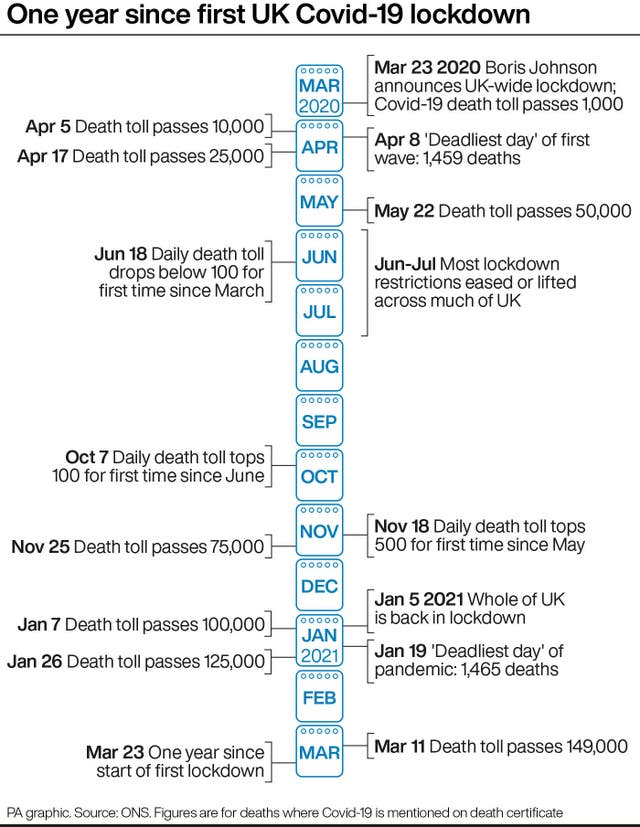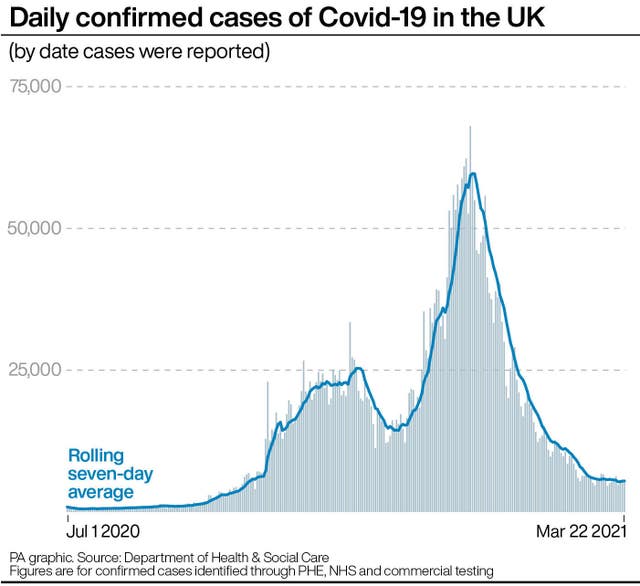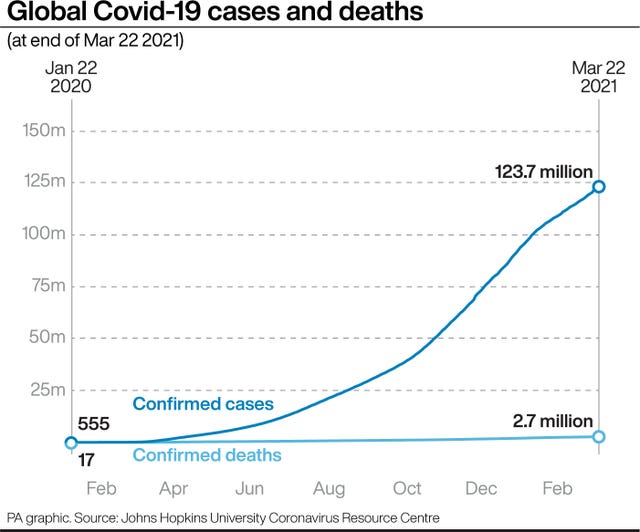The victims of Covid-19 are being remembered across the UK as the country marks the anniversary of the first national lockdown.
Prime Minister Boris Johnson has offered his “sincere condolences to those who have lost loved ones” as the nation prepares for a minute’s silence at midday.
With the official death toll passing 126,172 deaths, Mr Johnson has warned a third wave of Covid-19 cases being seen in France and Italy could “wash up on our shores as well”.
Health Secretary Matt Hancock said on Tuesday there are currently no plans to put all of Europe on the travel “red list”, which currently forces British nationals and people who are normally resident in the UK to quarantine in a Government-approved hotel for 10 days.
Mr Hancock, who spoke to his Spanish counterpart on Monday about whether travel could resume safely, told LBC: “We don’t have any plans to do that.
“We do have this red list and the amber list, and at the moment that is working well, so we don’t have plans to do that.”
On Monday, health minister Lord Bethell raised the prospect of having to “red-list all of our European neighbours”, putting plans for holidays abroad in jeopardy.
Mr Hancock said the ban on leaving the UK without a reasonable excuse, included in new coronavirus laws coming into force next week, had not changed the road map plans for international travel.

He told BBC Breakfast that current border measures were protecting the UK from new variants, some of which have been shown to evade a degree of immunity offered by vaccines.
He added: “The question is whether we’ll be able to release any of these measures over the summer.
“I entirely understand people’s yearning to get away and have a summer holiday, and we’re looking at that question right now as part of the global travel taskforce, which will report in the middle of next month.
“The earliest that will take any steps will be May 17 but, obviously, we’re taking a cautious approach because we want any openings that we make to be irreversible.”
He said the Government would only take “steps that we think are safe” but said “on the other hand, we do understand, of course I understand, how people want to be able to get away in the summer, especially after the last year that we’ve all had”.
Reflecting on the last year, Mr Hancock said: “I think the last year has been probably the hardest year in a generation.
“This crisis has touched everybody. My first thoughts go to those who’ve lost loved ones. The impact of that is permanent, I know that from my family.
“And, obviously, it’s vital that we are constantly learning and constantly looking at the evidence, listening to scientific advisers, listening to all of the advice and looking at what has happened and how we can improve the response throughout that.”
He said he was at home when he heard of the first Covid death, adding: “I remember sitting down and, you know, it really hit me.”
He added: “That was the first death and there have been many more since then, and it’s touched many, many families in this terrible way, and it’s just made me more determined to get us out of this.

“You can see now that the number of people going to hospital, thankfully, is really falling sharply and the number of people who are dying … these can just be statistics, but they really mean something.
“It’s very good news because fewer families are having to go through what so many families have been through.”
Labour leader Sir Keir Starmer said he would be joining the minute’s silence to remember those who have died.
He tweeted: “As we mark one year since our country entered the first lockdown, my thoughts are with all those who have lost loved ones since the pandemic began.”
Scotland’s First Minister Nicola Sturgeon tweeted: “One year on. Thinking today of all those who have lost a loved one to Covid, and to everyone who continues to make heartbreaking sacrifices as we continue to navigate our way through this terrible ordeal, together.

“Also, many people have lost loved ones to causes other than Covid over the past 12 months. The restrictions in place have made the grieving process even more difficult than it would have been – my thoughts are with you too.”
It comes as ministers continue to examine the issue of compulsory vaccination of care home staff in order to protect residents from coronavirus.
Mr Hancock insisted that “no decision” has yet been taken, though he said the Government was thinking about the move.
Medics working on the front line already have to have a hepatitis B vaccination to protect patients.
Mr Hancock said 76% of staff in care homes for the elderly had been vaccinated, and more than 90% of residents, but there was “still further to go”.
He told the BBC: “It’s important because those who look after people in care homes have a duty of care towards them and not every resident in a care home can be vaccinated.”
Elsewhere, Professor Calum Semple, a member of the Government’s Scientific Advisory Group for Emergencies (Sage), said he thought a third wave of coronavirus could potentially hit in the summer.
The UK is expecting another wave of infections at some point, mostly among the unvaccinated, but some scientists have suggested this will not be until the autumn or winter.
Prof Semple said: “The concern at present is that in countries where there’s less vaccination and a very strong third wave, that’s the perfect breeding ground for further variants of concern.
“So, at this point, Britain has got its act together, the concern is as this third wave is going on elsewhere, that will generate new variations.
The #COVID19 vaccination programme is the biggest in the history of the NHS.
Join the millions who have already had their first dose of the vaccine.
Find out more:▶️ https://t.co/PKVgX1hLvB pic.twitter.com/kHrrB9Hfqg
— Department of Health and Social Care (@DHSCgovuk) March 22, 2021
“Even within Britain there is a likelihood of a third wave in potentially July and August time, when we do unlock society.
“That third wave we would expect to occur in people that are less susceptible to very severe disease.
“It’s inevitable as we unlock there will be an rise in cases, the key here is have we won the race to vaccinate the most vulnerable members of society so we can keep society open this time?”
Meanwhile, diplomatic efforts are continuing in a bid to ward off a possible ban on vaccine exports from the European Union amid a row over supplies.
German Chancellor Angela Merkel told reporters she and French President Emmanuel Macron had each recently spoken to Mr Johnson about the matter, adding EU leaders aimed to reach a decision “in a responsible way” during their virtual summit on Thursday.




Comments & Moderation
Readers’ comments: You are personally liable for the content of any comments you upload to this website, so please act responsibly. We do not pre-moderate or monitor readers’ comments appearing on our websites, but we do post-moderate in response to complaints we receive or otherwise when a potential problem comes to our attention. You can make a complaint by using the ‘report this post’ link . We may then apply our discretion under the user terms to amend or delete comments.
Post moderation is undertaken full-time 9am-6pm on weekdays, and on a part-time basis outwith those hours.
Read the rules here